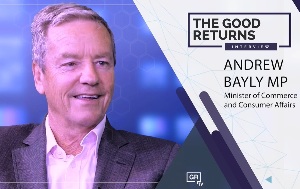[GRTV] Bayly wants a twin peaks model for financial regulation
Minister of Commerce and Consumer Affairs Andrew Bayly talks to Good Returns TV about his plans for financial services, why KiwiSaver reform is not top of the list and his views on financial advice.
Monday, March 25th 2024, 6:23AM
by Andrea Malcolm

Before the election he had wanted to scrap the Financial Markets (Conduct of Institutions) Amendment Act introduced by the previous government, but since then he has spoken with CEOs of some of the largest affected filing entities, such as banks and insurance companies. The feedback was that they had largely completed the work, albeit at great expense, and they wanted to go ahead and file their applications.
He says he had heard that of the 200 required to file, about 100 hadn’t started the process because they were worried about what the FMA would require. So he has also spoken to the FMA about guidelines.
“First principle is to work out what’s proportional in terms of conduct for your entity,” he says.
With 25 years experience in financial services and having once chaired a financial planning company, the new minister has engaged quickly with the sector.
“It’s such a big part of the economy that getting the settings right, in terms of access to finance, is very important.”
He says he wants to simplify the sector, make it easier to understand and cheaper for people to operate while not compromising standards.
“People who aren’t super wealthy should be able to get access to financial advice. I’m talking to the FMA.” He says there is a role for the government to incentivise the provision of advice around KiwiSaver, through enabling good conduct and settings rather than legislation.
“The architecture of financial regulation is very complicated and overlapping. Let’s go back to the twin peaks model, so we have the Reserve Bank doing prudential control and the FMA as the sole conduct regulator.” That includes moving regulation of the Credits Contract and Consumer Finance Act (CCCFA) regulation from the Commerce Commission to the FMA, and replacing multiple licence requirements with a single licence.
He says the government may also look at the CoFI settings under which FAP directors take on the risk of all the financial advisers under them.
Much of it won’t require legislation, he says. It is more about working with the regulators on settings and guidelines.
As well as the CCCFA, other legislative reform underway includes the introduction of an insurance contracts bill, a customer data rights bill, and reform of the Companies Act for the first time in 30 years, he says.
On the Companies Act, he says people now don't want to be a director because of the risk imposed through the layering up of legislation.
Later this year, says Bayly, he wants to focus on capital markets. “How to get more capital coming into New Zealand businesses.” That includes making it easier for KiwiSaver providers to invest in NZ businesses.
Then there is the KiwiSaver settings themselves. “I don't think working on settings will be difficult,” he says.
National’s announcement that KiwiSaver members should be able to split their savings across different providers has always been aimed at people with higher balances - a minimum of $100,000, he says. On the party’s other KiwiSaver announcement that it could be used by students to pay for tenancy bonds, he says some young people want it but he has yet to talk to coalition partners about it.
He doesn’t see having a three party government as a barrier to progres.
“Last week we got rid of the business payment practices bill; pushed it through in urgency. The legislative framework will be tight because all ministers want to do stuff. But once there is room in the house we’re ready to roll because everything is in place.”
| « [GRTV] A trip around investment issues with MyFiduciary’s Chris Douglas | [GRTV] FANZ stands on its legacy in face of competition in the mortgage space » |
Special Offers
Comments from our readers
No comments yet
Sign In to add your comment
| Printable version | Email to a friend |


